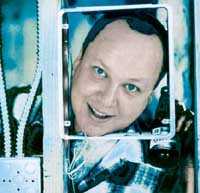Frank Black went solo after The Pixies split in 1993.
"I can't understand personal suffering. I have a good time making my records!"
Born Charles Michael Kitteridge Thompson IV (naturally), Frank Black was lead singer in The Pixies, Boston's most influential group of recent times. He is therefore assured a place in rock'n'roll's Hall of Fame, even if it's just in the hallway.
In 1993, after five acclaimed albums, The Pixies had looked set to break into the mainstream in a big way. Weird, peculiar, angular and highly eclectic, their aforementioned influence filtered down into what would become America's highly lucrative alternative rock genre, most notably with Nirvana, whose singer Kurt Cobain never missed an opportunity to namecheck Frank Black. But Black Francis, as he was then known, had had enough of sharing the limelight, and of band tensions - notably between himself and bassist Kim Deal. Francis announced the split - a shock to most in the music press - on the release (coincidentally enough) of his first solo album, Frank Black (1993), a title shared with his 'new' handle. While interviewers were hellbent on quizzing the singer about his decision behind the split, all he wanted to do was talk about the future, starting now, but finding this impossible he vowed never to do another interview. The album, nonetheless, was widely celebrated for sounding like The Pixies only more
so: harder, faster, and heavy with gloriously askew melody, beefy horns and Iggyish metal riffing. It was imbued, too, with Black's characteristic off-centre humour and enduring fascination with UFOs. All, you might think, ample compensation for The Much-Loved Band That No Longer Existed.
Surprisingly, though, it sold badly, and to rub salt into the wounds, Kim Deal's new band, The Breeders, sailed into the charts with their album, . . . Last Splash. Black, undeterred, returned to his Californian studio with Eric Feldman (ex-Captain Beefheart and Pere Ubu) adding keyboards and co-producing, emerging a year later with the gargantuan Teenager Of The Year (1994). Herein, it appeared that our hero had, if not lost it exactly, certainly taken the wrong turning somewhere. The double CD's 22 tracks served to confound, bemuse and perplex listeners with guitar noise one minute, cod reggae the next, meandering instrumentals here and there, and a whole stream of consciousness pervading the abstruse lyrics. Black, meanwhile, did no press whatsoever, an action that could have been perceived as enigmatic but in reality served only to distance him from his old fan base. The record, inevitably, bombed. But then something changed, as Black rediscovered ambition. He parted company with the cult 4AD label and si
gned on with Epic - home to Pearl Jam, Michael Jackson and Cyndi Lauper - and started courting the press again, welcoming journalists into his home, conviviality itself. Which is where The Cult Of Ray (1996), his third solo album, comes in.
Slimmed down to just thirteen tracks, Ray asserted itself as a far more streamlined affair than its wayward predecessor, confirming once more that Frank Black's off-kilter, 'alternative' American rock music really did rock. It also boasted the sweetest pop song he'd written in an age, "I Don't Want To Hurt You (Every Single Time)", proving that Black had never lost it at all. Of course he hadn't. He'd just got lazy. Still, mainstream success did not follow, and nor did critical acclaim, with the music press comparing the new album to Tom Petty, and some going so far as to suggest that Black had become 'boring' - something few would have thought possible from the man who wrote "Planet Of Sound". The hardcore fans, meanwhile, are convinced that this is an interim imitation-robot phase, and that the real Frank is up there with the aliens . . .
Frank Black (1993: 4AD). Black at his most rotund, musically speaking, lying the fattest of melodies on top of big, chugging guitars and those trademark vocals of his that sound like he's swallowed an egg. "Los Angeles", "Fu Manchu" and his cover of the obscure Beach Boys track, "Hang On To Your Ego", in particular, confirm that Black's hypnotically strange tunes are pretty much peerless.
